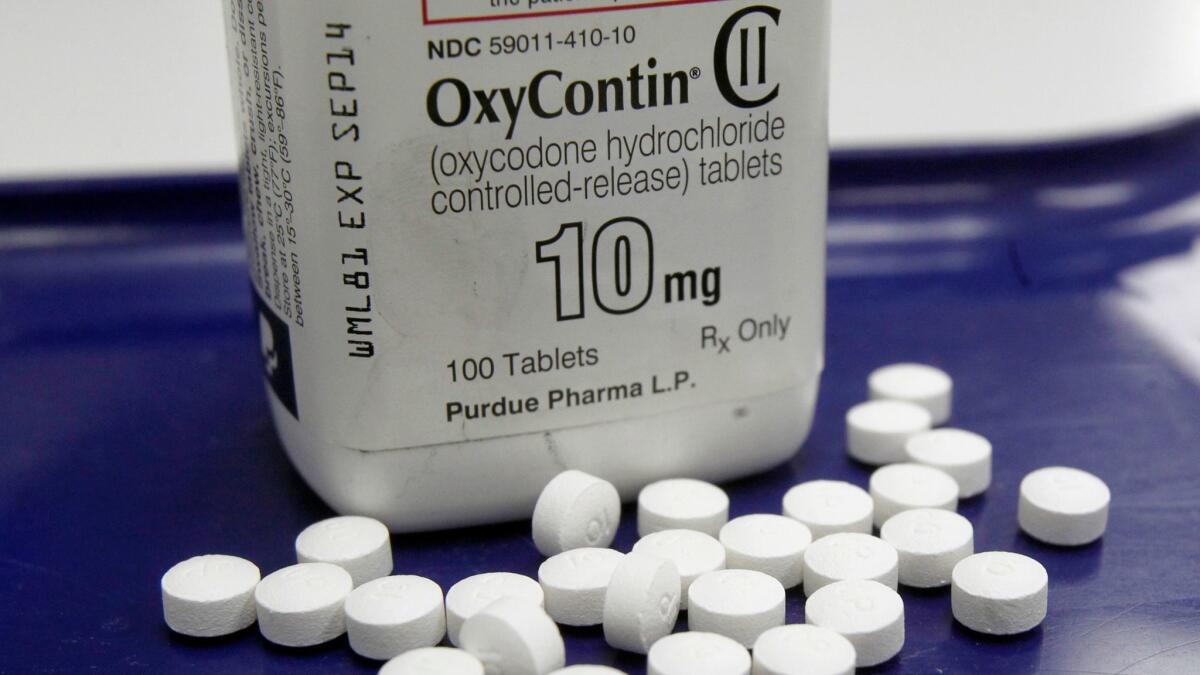Editorial: Slashing Medicaid is probably the worst way to fight an opioid addiction epidemic

- Share via
Most readers know by now that deep cuts to Medicaid over the next decade are a central feature of the healthcare reform proposal before the U.S. Senate this week — and a terrible policy that would put health coverage out of reach for millions of Americans. But here’s yet another reason why senators should think twice about voting for the Better Care Reconciliation Act: Doing so would pull the rug out from under those fighting to stop the raging opioid epidemic.
That should resonate with President Trump, not just because opioid addiction has disproportionately affected states that powered his victory in November, including Ohio, West Virginia and Kentucky, but also because Trump promised on the campaign trail to stop the opioid scourge. In March, in fact, he formed a commission to study the crisis and appointed a political ally, New Jersey Gov. Chris Christie, to run it.
The President’s Commission on Combating Drug Addiction and the Opioid Crisis, which is charged with evaluating and improving the federal response to the epidemic, is expected to make its first report later this month. If Christie and his fellow commissioners are honest, then they will have no choice but to point out to Trump that the biggest threat to the government’s ability to fight the scourge is the healthcare reform he is pushing. Slashing Medicaid and threatening the requirement that private insurers cover drug treatment isn’t just “mean” (which is what he called the House’s version of healthcare reform), it could be fatal.
The number of opioid abusers in America has quadrupled since 1999.
That’s not hyperbole, it is a grim reality of the raging opioid epidemic. Deaths from drug overdose have been climbing precipitously in the last decade, driven primarily by an explosion in opioid use in the form of heroin and prescription drugs such as hydrocodone and fentanyl. The number of opioid abusers in America grew to 2.5 million in 2015, according to the Centers for Disease Control and Prevention. That same year 33,000 people died as a result of opioid use, 5,000 more than the year before. Even with so many people dying, the numbers of drug overdoses are continuing to climb partly because of the accessibility of illegal opioids.
The best way to curb these deaths, short of making the drugs disappear, is to get people to stop using them. Although private insurers cover more of the people getting treatment, Medicaid picks up a large share of the cost nationwide — about 30% — and covers those who are costliest to treat.
The death toll from opioids might have been higher had it not been for the Affordable Care Act, which expanded Medicaid coverage from its core beneficiaries — poor children, pregnant women and disabled or aged adults — to also insure poor but able-bodied adults without children, as well as families and disabled Americans with incomes a little bit above the poverty line. (Not all states elected to participate in the expansion.)
Although the problem isn’t as bad in California as in some other states, opioid abuse here is on the rise, accounting for an increasingly large share of the substance abuse treatment provided. In 2012, for example, 31% of those seeking substance abuse treatment reported an opiate as their primary drug. By 2015, that figure had jumped to 41%.
But if the Senate bill passes, the state could lose $30 billion a year in federal funding by 2027. Such a deep cut could force California to cut back drug treatment and other optional benefits just to keep covering what federal law requires.
Some Republicans want to attack the opioid problem by dedicating more dollars to it. The Senate bill includes $2 billion for opioid treatment, which is a drop in the bucket compared with what the nation needs. Senate GOP leaders have floated an amendment to increase that sum to $45 billion. That wouldn’t be enough either, but the larger problem with this approach is that it assumes that the only health problem that opioid addicts would face after they’re cut off from Medicaid is their addiction. Long-term drug abuse causes a number of health conditions, including organ damage and mental illness.
Opioid addiction is one of the most challenging public health crises in recent U.S. history. It’s absolutely the worst time to undercut efforts to respond to that crisis by taking access to treatment away from those who need it the most.
Follow the Opinion section on Twitter @latimesopinion and Facebook
More to Read
A cure for the common opinion
Get thought-provoking perspectives with our weekly newsletter.
You may occasionally receive promotional content from the Los Angeles Times.










